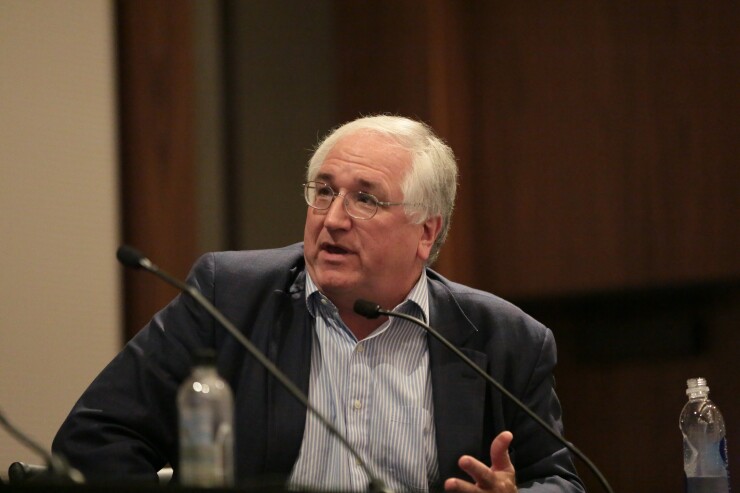Mobile and contactless payments have generated more consumer attention as ways to safely move money during the coronavirus pandemic, but there's also a growing wave of support for The Clearing House's Real Time Payments network for banks.
In place
"When businesses and individuals went into lockdown in March, we saw a little dip in volume, but that was a time when people were trying to wrap their arms around this pandemic," said Steve Ledford, senior vice president of products and strategy at The Clearing House.
It didn't take long for the RTP rails to start seeing more transactions, mainly because people were starting to move money to other individuals or accounts.
"Folks were generally trying to get their finances in order, and when economic stimulus money came in, they wanted to move that money around as well," Ledford said.

Ultimately, the pandemic has given banks and credit unions an opportunity to see if RTP meets their needs. And coronavirus created some scenarios in which businesses seeking supplies had no other option than to move money quickly in order to serve customers during the pandemic.
"We saw a rapid increase in the number of new originators sending thousands of dollars in B2B payments," Ledford said. "The banks were telling us that some clients had supply chain issues and had to go to new suppliers to be able to stock their shelves. With those new suppliers, they had to pay in advance to get the products."
The Clearing House has nearly 30 U.S. banks and credit unions on the RTP network, and says it may roughly double that number over the next month or two — and add significant numbers of new users every month "into the foreseeable future," Ledford said.
RTP now connects about 50% of the country for issuing faster payments. By the end of 2021, Ledford envisions the network covering 80% of the country. Initially, The Clearing House had envisioned RTP ubiquity by end of 2020, but banks had been slower to adopt and some smaller institutions are
Similarly,
In addition to The Clearing House RTP, the ACI onboarding into a public cloud or managed platform environment has included the U.K.'s Faster Payments, India's Unified Payments Interface, Malaysia's Real-Time Retail Payments Platform, Singapore Fast and the Australian New Payments Platform.
While bringing RTP's benefits to the forefront, the pandemic has also created a bit of anxiety in that many bank customers are facing new fraud threats as a result of faster payments
"Fraudsters continue to perpetrate scams like they had previously, but now doing it in manners related to coronavirus," said Dave Excell, founder of Featurespace, a Cambridge, U.K.-based company that provides fraud and anti-money-laundering protections in real time. Featurespace also has offices in Atlanta and London.
"They can be phishing messages about pandemic cures or face masks" to trick victims into downloading malware, Excell said. "The underlying fraud continues to be social engineering scamming and getting access to financial business accounts and at the banks."
By mid-April, the
At the same time, Google was reporting blocking up to
Especially during the pandemic, banks and businesses need fraud protections in place that connect the digital payment channel with the mobile or other payment mechanism. With faster payments, there isn't enough time to be guessing about authorization.
Featurespace has discovered COVID-19 tracking apps and "heat maps" that carry underlying malware, as well as one posing as a university canceling classes because of coronavirus, with the links instead downloading malware.
"You are not doing fraud screening in isolation," Excell said. "You have to put together the complete customer journey in its entirety as the opportunity we have to prevent fraud. In that manner, you look at the context of real-time payments against the context of how a customer has historically made payments through the bank."
For that reason, Ledford contends, the flow of money to the recipient is a key component of understanding and preventing fraud.
"One of the best ways to identify an individual doing fraud is to see where the money goes, because the reason they are doing fraud is to get money," Ledford added. "We require members of the RTP network to report any fraud detected, and that kind of discipline in identifying and understanding is what goes into whatever your fraud protection mechanisms are."
Since its launch, the RTP network has enabled push payments from one account to another, but also the request for payment capability for bill payments. That feature brought new requirements for monitoring senders and other due diligence that validates a requester and the reason for the request.
"As new capabilities are added to something like the RTP network, you have to make sure those are protected," Ledford said. "You have to protect against any new vulnerabilities and do it in a way to make people comfortable using the RTP for payments."





